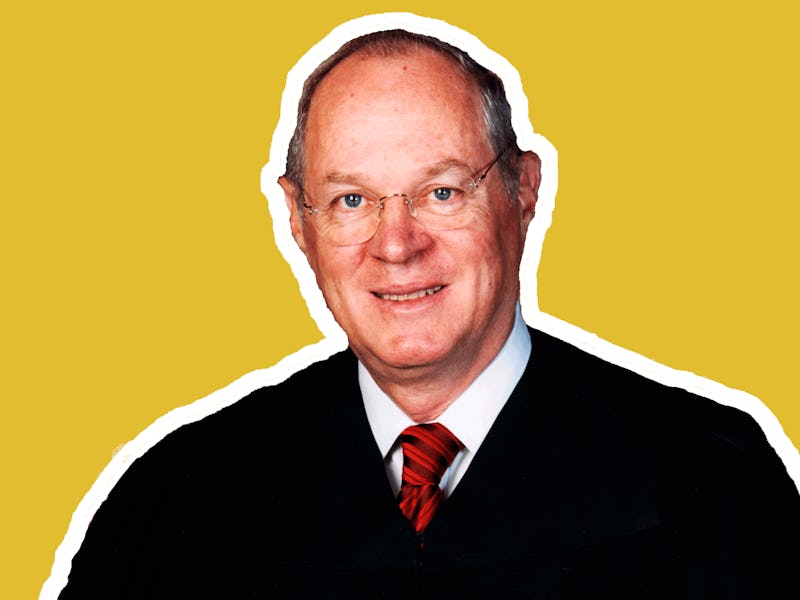How Justice Anthony Kennedy Dragged Us Into the Future
Justice Kennedy represented changing liberal and conservative ideologies.

When Donald Trump was elected president, progressives wondered what the worst possible outcome might be. One common fear was that a Supreme Court justice would die, or vacate the bench, leaving another spot for Trump to fill with a far-right figure. It represents the “worst nightmare for liberals,” The Guardian opined this week, after 81-year-old Justice Anthony Kennedy announced he would retire after 30 years.
The president’s son tweeted:

Welcome to your worst nightmare, Democrats. But, the irony of Kennedy’s decision to let Trump nominate a conservative-leaning justice is that he came to define a changing, more progressive culture during the latter part of his career. His role in landmark decisions for gay rights tracked shifting public opinion, but his latest conservative rulings have been a stark reminder that Kennedy was willing to roll with the political tide.
There is no question that, particularly in recent years, Kennedy was the deciding factor in controversial cases. Despite his conservative leanings, he contributed to a wave of progressive victories, including those that restricted capital punishment and advanced equality like gay marriage. He also issued decisions that adhered more closely to the GOP’s stance on religious liberty, voting rights, and campaign finance.
Kennedy’s Progressive Side
After Ronald Reagan nominated Kennedy for an open seat on the Supreme Court and he was confirmed by Congress, he was a powerful deciding vote in favor of gay rights, abortion, affirmative action, and the death penalty.
For gay rights, especially, Kennedy has echoed the changing popular opinion toward same-sex relationships. In 2003, he argued in the majority opinion for Lawrence v. Texas that a law against same-sex intimacy violated the Due Process Clause. Concurrently, the percentage of Americans who opposed same-sex marriage was on the decline, with the eventual shift to majority support occurring in 2011.
In his most liberal-leaning year, 2015, under President Barack Obama’s administration, he wrote the majority opinion in Obergefell v. Hodges, the case that guaranteed the right to same-sex marriage. In 1992’s Planned Parenthood v. Casey, he voted along with the opinion that abortion is a right under Roe v. Wade, a decision that matched the 49 percent of people who believed abortion should be legal in some cases. And in 2008, he authored the majority opinion for Baze v. Rees, ruling that the state of Kentucky could not impose the death penalty on a defendant who did not intend for his actions to result in murder.
Conservative Kennedy
Kennedy would often revise his opinion on previous assertions based on the facts of the latest case. While some might have viewed this as fickle judgment, he bristles at the idea that he’s a “swing vote.”
“The cases swing, I don’t,” he said in 2015 during a discussion at Harvard Law School.
Nevertheless, Kennedy’s conservative opinions often represented shifting cultural values. In Stenberg v. Carhart, Kennedy dissented against the decision to strike down laws that criminalized partial-birth abortion after Roe v. Wade, despite his decision that supported the ruling in 1992. The decision came shortly after a nearly 10 percent increase in the number of Americans who identify as pro-life.
The opinion he wrote for Obergefell v. Hodges is oftentimes quoted in same-sex marriage vows, yet he voted in 2018 in Masterpiece Cakeshop v. Colorado Civil Rights Commission to allow a Colorado baker to deny same-sex couples service based on his religious beliefs. The decisions, which might appear to be conflicting, actually both reflect different cultural trends. Aside from the increasing cultural favor given to same-sex marriage, Republicans have increasingly focused on ‘religious liberty’ as a pet judicial project.
Under Presidents Barack Obama, Bill Clinton, and Ronald Reagan, Kennedy sided more often with liberal ideals and stances. Under George W. Bush, he slid to the right. Under Trump, he veered even further.
This past term, Kennedy sided overwhelmingly with conservatives, reflecting the cultural movement away from the progressive politics of President Obama. In most 5-4 or 6-3 decisions, he leaned to the right, including on National Institute of Family and Life Advocates v. Becerra, which struck down a California law to require pregnancy centers to inform women of abortion availability. He also voted in favor of Trump’s administration on unions, in Janus v. American Federation of State, County and Municipal Employees, which decided against collective bargaining fees, on online sales tax, in South Dakota v. Wayfair, and on removing infrequent voters from the rolls in Husted v. A. Philip Randolph Institute. Chief Justice John Roberts had most often been the deciding factor until this past year under Trump, when Kennedy took the influential lead. Choosing to retire now, in the throes of Trump’s administration, makes it clear that Kennedy does not share the same fears that progressives hold.
For better or for worse, Anthony Kennedy’s decisions were frequently a mirror reflecting a culture in flux, a swing vote seemingly influenced by the changing federal administration’s policies. While he authored watershed opinions concerning gay rights, upheld Roe v. Wade protections, and restricted the death penalty, he also had one of his most conservative terms yet during the Trump administration. And now, his final decision could be one of his most conservative, potentially cementing a conservative voice on the Court for years to come.